Theories, Principles and Models in Education & Training
23 Pages8515 Words438 Views
Added on 2022-11-28
About This Document
This document discusses the theories, principles, and models in education and training. It explores the different theories of learning and learning preferences, and how they can be applied to teaching, learning, and assessment. It also analyzes the theories and models of communication that can be applied in education, and the theories and models of assessment and curriculum development. The document concludes with an analysis of reflection and evaluation theories and models.
Theories, Principles and Models in Education & Training
Added on 2022-11-28
ShareRelated Documents
Theories, Principles and
Models in Education
&Training
1
Models in Education
&Training
1
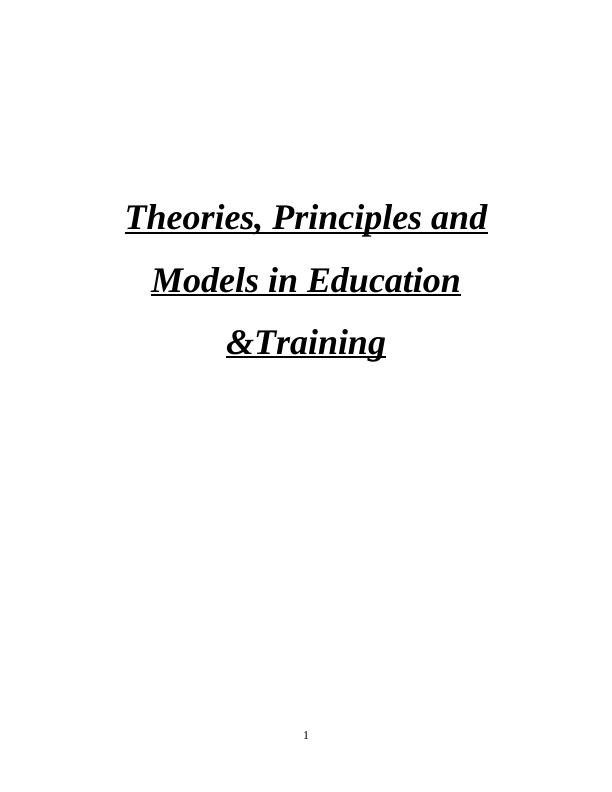
Contents
INTRODUCTION...........................................................................................................................3
Task 1 (Learning Preferences).........................................................................................................3
A. Identify and analyse theories, principles, and models of learning and learning preferences
................................................................................................................................................3
B. Explain ways in which theories, principles and models of learning can be applied to
teaching learning and assessment...........................................................................................5
C. Explain how identifying and taking account of learners’ individual learning preferences
enables inclusive teaching, learning and assessment.............................................................6
Task 2 (Communication).................................................................................................................7
A. Analyse theories, principles and models of communication that can be applied in teaching,
learning and assessment.........................................................................................................7
B. Explain ways in which theories, principles and models of communication can be applied to
teaching, learning and assessment in your own area of specialism........................................9
Task 3 (Assessment)......................................................................................................................11
A. Analyse theories, principles, and models of assessment.................................................11
B. Choose three Assessment methods from your teaching practice and write a report
explaining how a range of theories and principles of formal and informal assessment have
been applied in your assessment methods............................................................................13
Task 4 (Curriculum).......................................................................................................................14
A. Provide a written analysis of the theories and models of curriculum development........14
Task 5 (Reflection and Evaluation)...............................................................................................16
A. Identify and analyse theories and models of reflection and evaluation...........................16
B. Using at least two theories / models of reflection and evaluation explain how they can be
applied to your own reflective practice................................................................................19
CONCLUSION..............................................................................................................................20
REFERENCES..............................................................................................................................21
2
INTRODUCTION...........................................................................................................................3
Task 1 (Learning Preferences).........................................................................................................3
A. Identify and analyse theories, principles, and models of learning and learning preferences
................................................................................................................................................3
B. Explain ways in which theories, principles and models of learning can be applied to
teaching learning and assessment...........................................................................................5
C. Explain how identifying and taking account of learners’ individual learning preferences
enables inclusive teaching, learning and assessment.............................................................6
Task 2 (Communication).................................................................................................................7
A. Analyse theories, principles and models of communication that can be applied in teaching,
learning and assessment.........................................................................................................7
B. Explain ways in which theories, principles and models of communication can be applied to
teaching, learning and assessment in your own area of specialism........................................9
Task 3 (Assessment)......................................................................................................................11
A. Analyse theories, principles, and models of assessment.................................................11
B. Choose three Assessment methods from your teaching practice and write a report
explaining how a range of theories and principles of formal and informal assessment have
been applied in your assessment methods............................................................................13
Task 4 (Curriculum).......................................................................................................................14
A. Provide a written analysis of the theories and models of curriculum development........14
Task 5 (Reflection and Evaluation)...............................................................................................16
A. Identify and analyse theories and models of reflection and evaluation...........................16
B. Using at least two theories / models of reflection and evaluation explain how they can be
applied to your own reflective practice................................................................................19
CONCLUSION..............................................................................................................................20
REFERENCES..............................................................................................................................21
2
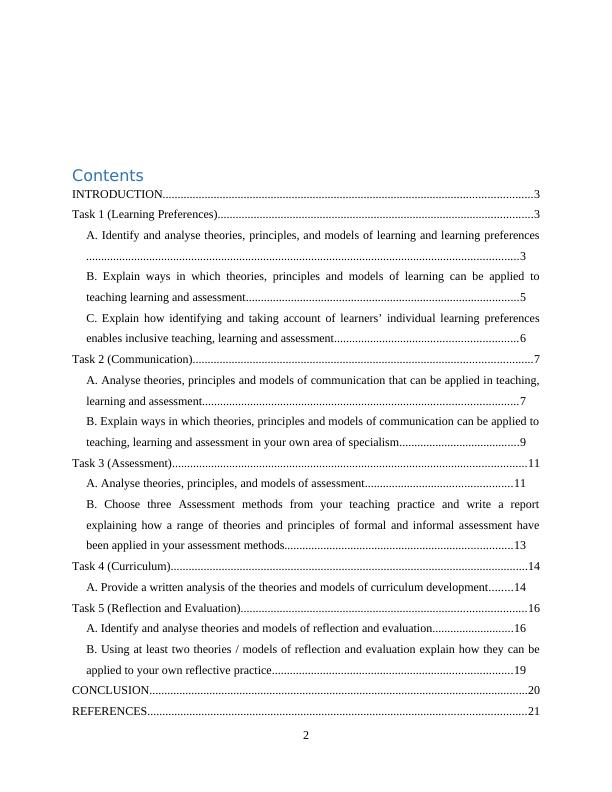
3

INTRODUCTION
In education and training, principles, theories and models are very important as this will help
in improving the learning of learners. There are different models, principles and theories that
makes it easy for the learner to understand the concept in a significant way and gain better
understanding of the way learning happens. Training or learning is the process of gaining
knowledge through study or sometimes through experience. The individuals or professionals
who are engaged to teaching are supposed to administer practical curriculum. Training and
education are the ways through which the existing knowledge of the learners gets updated. A
supportive system of education allows flexible education and focuses on self-motivation of
students. Developing interest of students in the learning is a part of pedagogical approach of
teachers. This study is based on theories, principles and models in education and training.
The first part of the project discusses about the different theories, models and principles of
learning and learning preferences in education and training. The second task explains about the
theories and principles of communication utilised in learning, teaching and assessment. It also
analyses theories and principles of assessment that applied in assessment methods and teaching.
Apart from this, it provides written analysis of models and theories of curriculum development
and the different theories and models of evaluation and reflection also discussed in the report.
This project is being culminated with descriptive analysis of models, principles and theories of
curriculum and development along with the ways they can be well utilised and understanding of
reflection and evaluation models and theories within the study area.
Task 1 (Learning Preferences)
A. Identify and analyse theories, principles, and models of learning and learning preferences
Learning theories, principles and models are very significant with different reasons in daily
practice of the teachers of education and training. If the right strategies are determined, then
learning can effectively takes place. Thus, application of principles, theories and models of
learning help in ensuring absolute understanding and acquisitions. These also help in making the
learning easy for individuals. Different theories, principles and models of learning are discussed
below:
1. Behaviorism theory - this learning theory emphasizes on objectively observe the
behaviours as well as discounts any autonomous activities of mind. Behaviorists believe
4
In education and training, principles, theories and models are very important as this will help
in improving the learning of learners. There are different models, principles and theories that
makes it easy for the learner to understand the concept in a significant way and gain better
understanding of the way learning happens. Training or learning is the process of gaining
knowledge through study or sometimes through experience. The individuals or professionals
who are engaged to teaching are supposed to administer practical curriculum. Training and
education are the ways through which the existing knowledge of the learners gets updated. A
supportive system of education allows flexible education and focuses on self-motivation of
students. Developing interest of students in the learning is a part of pedagogical approach of
teachers. This study is based on theories, principles and models in education and training.
The first part of the project discusses about the different theories, models and principles of
learning and learning preferences in education and training. The second task explains about the
theories and principles of communication utilised in learning, teaching and assessment. It also
analyses theories and principles of assessment that applied in assessment methods and teaching.
Apart from this, it provides written analysis of models and theories of curriculum development
and the different theories and models of evaluation and reflection also discussed in the report.
This project is being culminated with descriptive analysis of models, principles and theories of
curriculum and development along with the ways they can be well utilised and understanding of
reflection and evaluation models and theories within the study area.
Task 1 (Learning Preferences)
A. Identify and analyse theories, principles, and models of learning and learning preferences
Learning theories, principles and models are very significant with different reasons in daily
practice of the teachers of education and training. If the right strategies are determined, then
learning can effectively takes place. Thus, application of principles, theories and models of
learning help in ensuring absolute understanding and acquisitions. These also help in making the
learning easy for individuals. Different theories, principles and models of learning are discussed
below:
1. Behaviorism theory - this learning theory emphasizes on objectively observe the
behaviours as well as discounts any autonomous activities of mind. Behaviorists believe
4
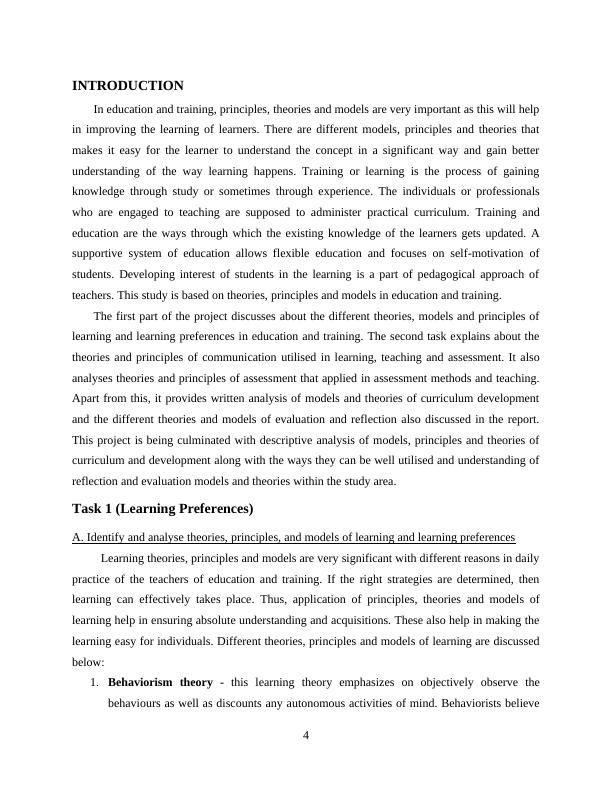
that it actually arises when alterations in behaviour are gained through associations
among stimuli and response. Therefore, association leads to change in behaviour and the
process of learning is directly impacted through behaviour of an individual. This theory
was developed from the outcomes of Pavlov's experiments on dogs. It puts the teacher at
center after process of learning instead of being student centered. In this theory, the most
significant practices are to develop detailed guidelines for people by tutor in terms of
acquiring positive experiences as well as reshaping the current information provided.
2. Cognitivism theory - this theory provides learners with the chance to get acknowledged
regarding themselves as well as their preferred process of learning. The intellectual
process of learning in this theory is mainly given during concentration specifically the
process of thought of student. According to this theory, the process of learning is defined
as acquiring knowledge from sense, incidents, experience and thoughts. It suggests
teachers to develop a strategy to keep the learner focus and keep their attention at its
higher level by utilizing tools like visual aids, spider maps, mind mapping and
presentations.
3. Procedural vs declarative knowledge - these are the two different learning ways
introduced by Anderson. Declarative knowledge is defined as the conscious and specific
materials to the learner's experience. This type of knowledge answers of WH questions
and there is no option to develop something new. On the other hand, procedural
knowledge is defined as the indication of 'the way to do something'. This type of
knowledge is acquired by the learners through practical class. The learners are usually
more interested to procedural learning whereas, declarative knowledge can be acquired at
moment however, procedural knowledge is not.
4. Vygotsky's social development theory - the theorist suggested a milestone approach of
social development theory. This option allows learner to work more autonomously with
the acquired knowledge. The theorist believes that children learn regarding their world by
physical interactions. Learning is being crucial social process where the support of peers,
caregivers, wider society and parents and culture plays significant role in higher
psychological functions development. The initial development of the children was
prompted through their immediate social interactions.
Models of learning preferences:
5
among stimuli and response. Therefore, association leads to change in behaviour and the
process of learning is directly impacted through behaviour of an individual. This theory
was developed from the outcomes of Pavlov's experiments on dogs. It puts the teacher at
center after process of learning instead of being student centered. In this theory, the most
significant practices are to develop detailed guidelines for people by tutor in terms of
acquiring positive experiences as well as reshaping the current information provided.
2. Cognitivism theory - this theory provides learners with the chance to get acknowledged
regarding themselves as well as their preferred process of learning. The intellectual
process of learning in this theory is mainly given during concentration specifically the
process of thought of student. According to this theory, the process of learning is defined
as acquiring knowledge from sense, incidents, experience and thoughts. It suggests
teachers to develop a strategy to keep the learner focus and keep their attention at its
higher level by utilizing tools like visual aids, spider maps, mind mapping and
presentations.
3. Procedural vs declarative knowledge - these are the two different learning ways
introduced by Anderson. Declarative knowledge is defined as the conscious and specific
materials to the learner's experience. This type of knowledge answers of WH questions
and there is no option to develop something new. On the other hand, procedural
knowledge is defined as the indication of 'the way to do something'. This type of
knowledge is acquired by the learners through practical class. The learners are usually
more interested to procedural learning whereas, declarative knowledge can be acquired at
moment however, procedural knowledge is not.
4. Vygotsky's social development theory - the theorist suggested a milestone approach of
social development theory. This option allows learner to work more autonomously with
the acquired knowledge. The theorist believes that children learn regarding their world by
physical interactions. Learning is being crucial social process where the support of peers,
caregivers, wider society and parents and culture plays significant role in higher
psychological functions development. The initial development of the children was
prompted through their immediate social interactions.
Models of learning preferences:
5
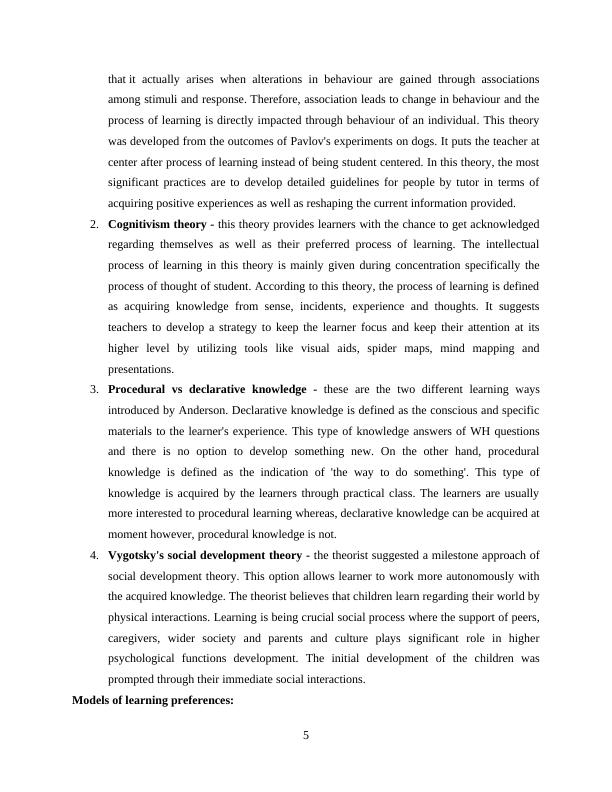
1. Honey and Mumford model of learning - this learning model was developed by Peter
Honey and Alan Mumford in which four learning styles are defined including activist,
theorist, pragmatist and reflector. These learning approaches are those which an
individual propose naturally and they recommend that approach to increase one's own
personal learning. According to the activist learning style, they are the individuals who
learn through doing. They are enthusiastic and like to get the hands dirty in trying new
things. Theorists are the individuals who learn best through understanding theory behind
actions. They require facts, concepts and models to engage in the process of learning.
Pragmatists are the individuals who learn best when they can see the way what they are
learning. They see the way to put learning into practice. Reflectors are the individuals
who learn by observing as well as thinking regarding what happened. They prefer to
stand back as well as see experiences from different perspectives, gathering data or
information take time to get to the conclusion.
B. Explain ways in which theories, principles and models of learning can be applied to teaching
learning and assessment
If the well known facts are used and attached to set up new ones through anchoring on
known theories and facts that have been applied and found, learning is better improved. The
learner is encouraged to furnish himself or herself with needed materials that have been found to
define certain model, theories or principles and utilise it to develop better models and principles.
The behavioural theory in teaching can be applied in ways of punishments and rewards. Yet, it is
not effective in contemporary practices as teaching is not highly structured as well as
responsibility of student is not high however, tutor is responsible for learning. Apart from this, if
this theory is applied in classroom, it doesn't acknowledge differences of learners. On the other
hand, cognitive theory is applied in the learning for encouraging curiosity as well as testing
hypothesis for the projects which are inquiry oriented. As the modern engages experiences of
past in learning, teacher can involve a scenario to develop an environment for learners to be
familiar with.
According to the social learning theory, it is assumed that classroom can be utilised as
social construction where learners to collaborate in groups as well as work in teams to model
expectation and responses altogether. The social learning theory in combination to
constructivism can be utilised in form of empirical and journaling activities to develop
6
Honey and Alan Mumford in which four learning styles are defined including activist,
theorist, pragmatist and reflector. These learning approaches are those which an
individual propose naturally and they recommend that approach to increase one's own
personal learning. According to the activist learning style, they are the individuals who
learn through doing. They are enthusiastic and like to get the hands dirty in trying new
things. Theorists are the individuals who learn best through understanding theory behind
actions. They require facts, concepts and models to engage in the process of learning.
Pragmatists are the individuals who learn best when they can see the way what they are
learning. They see the way to put learning into practice. Reflectors are the individuals
who learn by observing as well as thinking regarding what happened. They prefer to
stand back as well as see experiences from different perspectives, gathering data or
information take time to get to the conclusion.
B. Explain ways in which theories, principles and models of learning can be applied to teaching
learning and assessment
If the well known facts are used and attached to set up new ones through anchoring on
known theories and facts that have been applied and found, learning is better improved. The
learner is encouraged to furnish himself or herself with needed materials that have been found to
define certain model, theories or principles and utilise it to develop better models and principles.
The behavioural theory in teaching can be applied in ways of punishments and rewards. Yet, it is
not effective in contemporary practices as teaching is not highly structured as well as
responsibility of student is not high however, tutor is responsible for learning. Apart from this, if
this theory is applied in classroom, it doesn't acknowledge differences of learners. On the other
hand, cognitive theory is applied in the learning for encouraging curiosity as well as testing
hypothesis for the projects which are inquiry oriented. As the modern engages experiences of
past in learning, teacher can involve a scenario to develop an environment for learners to be
familiar with.
According to the social learning theory, it is assumed that classroom can be utilised as
social construction where learners to collaborate in groups as well as work in teams to model
expectation and responses altogether. The social learning theory in combination to
constructivism can be utilised in form of empirical and journaling activities to develop
6
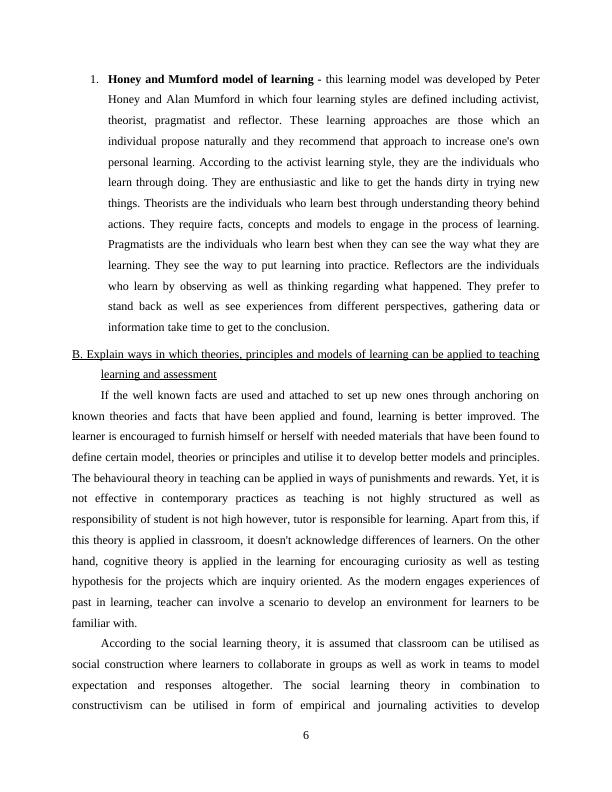
End of preview
Want to access all the pages? Upload your documents or become a member.
Related Documents
Theories, Principles, and Models in Education and Traininglg...
|13
|4185
|74
Theories, Principles and Models in Education and Training - Deskliblg...
|16
|6489
|253
Theories, Principles, and Models in Education and Traininglg...
|15
|4946
|81
Theories, Principles, and Models of Learning in Education and Traininglg...
|19
|6448
|30
Theories, Principles and Models in Education and Traininglg...
|17
|5899
|85
Analysis Theories, Principles, Models of Learning Preferences : Assignmentlg...
|34
|9367
|354
